
Rennes: The Heart of Brittany
Rennes, the capital of Brittany in France, is a city rich with history, culture, and charm. Known for its medieval half-timbered houses and vibrant student population, Rennes offers a delightful mix of old and new. The city is home to the beautiful Thabor Park, which spans over 10 hectares and is perfect for a leisurely stroll or a relaxing picnic. The cobblestone streets of the historic center are lined with unique shops, cafés, and restaurants, providing plenty of opportunities to indulge in local cuisine and culture. One of the highlights of Rennes is its stunning architecture, including the impressive Rennes Cathedral and the Parlement de Bretagne. The latter is a magnificent example of 17th-century architecture and a must-see for history enthusiasts. Art lovers will appreciate the Musée des Beaux-Arts, which houses an impressive collection of European paintings and sculptures. Additionally, the city's vibrant cultural scene is showcased through various festivals and events throughout the year, such as the famous Trans Musicales music festival. Rennes is also an excellent base for exploring the wider Brittany region. From here, you can easily visit charming coastal towns like Saint-Malo and Dinard, or venture further to the rugged landscapes of the Breton countryside. Whether you're interested in history, art, or simply soaking up the local atmosphere, Rennes has something to offer every traveler.
Local tips in Rennes
- Visit the Marché des Lices on Saturday mornings for a taste of local produce and specialties.
- Take advantage of the city's comprehensive bike-sharing system to explore Rennes at your own pace.
- If you're a fan of street art, don't miss the annual Teenage Kicks festival, which brings together artists from around the world.
- For a panoramic view of the city, climb to the top of the Saint-Pierre Cathedral.
- Try the local delicacy, galette-saucisse, a savory sausage wrapped in a buckwheat pancake, available at street stalls and markets.
Neighbourhoods in Rennes
Rennes: The Heart of Brittany
Rennes, the capital of Brittany in France, is a city rich with history, culture, and charm. Known for its medieval half-timbered houses and vibrant student population, Rennes offers a delightful mix of old and new. The city is home to the beautiful Thabor Park, which spans over 10 hectares and is perfect for a leisurely stroll or a relaxing picnic. The cobblestone streets of the historic center are lined with unique shops, cafés, and restaurants, providing plenty of opportunities to indulge in local cuisine and culture. One of the highlights of Rennes is its stunning architecture, including the impressive Rennes Cathedral and the Parlement de Bretagne. The latter is a magnificent example of 17th-century architecture and a must-see for history enthusiasts. Art lovers will appreciate the Musée des Beaux-Arts, which houses an impressive collection of European paintings and sculptures. Additionally, the city's vibrant cultural scene is showcased through various festivals and events throughout the year, such as the famous Trans Musicales music festival. Rennes is also an excellent base for exploring the wider Brittany region. From here, you can easily visit charming coastal towns like Saint-Malo and Dinard, or venture further to the rugged landscapes of the Breton countryside. Whether you're interested in history, art, or simply soaking up the local atmosphere, Rennes has something to offer every traveler.
When is the best time to go to Rennes?
Iconic landmarks you can’t miss
Parc du Thabor
Explore the stunning Parc du Thabor in Rennes, where lush gardens, historical features, and vibrant culture create a serene getaway in the city.
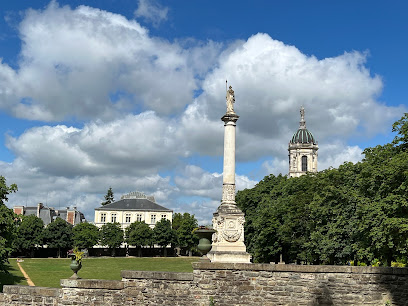
Parc des Gayeulles
Explore the natural beauty and recreational offerings at Parc des Gayeulles, a lush park in Rennes perfect for relaxation and outdoor activities.
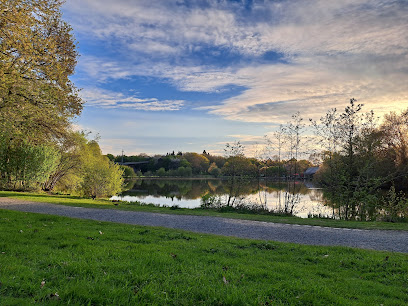
Le Liberté
Discover the vibrant cultural scene of Rennes at Le Liberté, a premier performing arts theater offering an array of concerts and events.
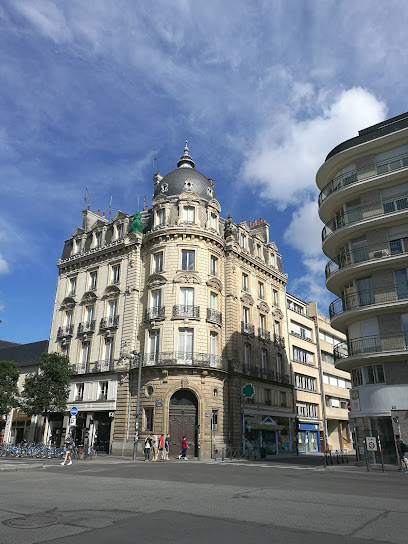
Cathedral Saint-Pierre de Rennes
Explore the awe-inspiring Cathedral Saint-Pierre de Rennes, a masterpiece of architecture and a focal point of the city's history and culture.
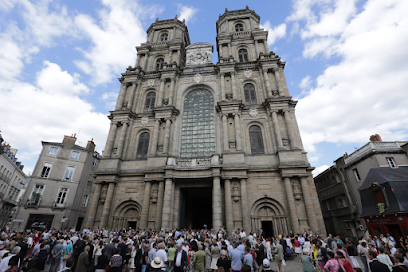
Musée des Beaux-Arts de Rennes
Explore a masterpiece collection at the Musée des Beaux-Arts de Rennes, where art history comes alive in a stunning setting.
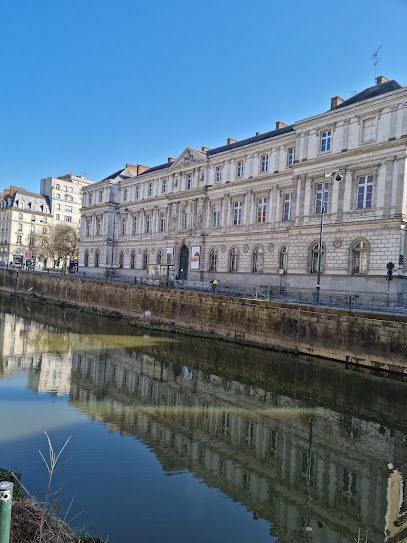
Couvent des Jacobins
Discover the stunning Couvent des Jacobins in Rennes, a historic exhibition center blending culture, art, and architectural beauty.
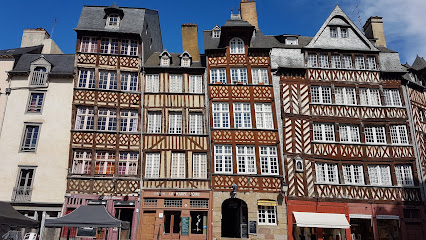
Park Hamelin Oberthur
Discover the tranquility of Park Hamelin Oberthur, a lush green haven in the heart of Rennes, perfect for relaxation and family fun.
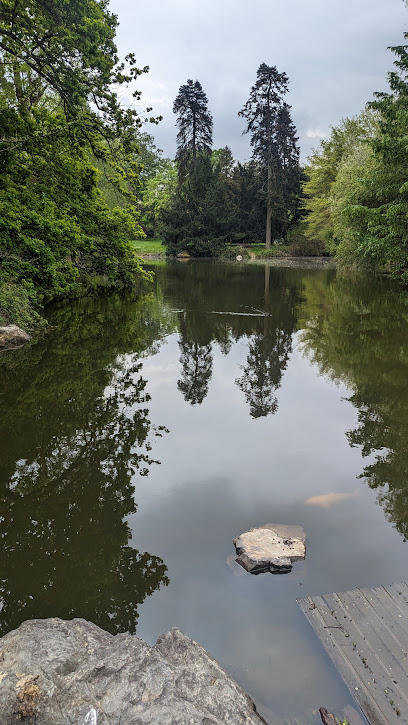
Balthazar Hôtel & Spa Rennes - MGallery
Discover the luxurious Balthazar Hôtel & Spa Rennes - MGallery, where elegance meets the vibrant culture of Rennes, France.

Park Bréquigny
Discover the natural beauty of Park Bréquigny in Rennes, a perfect retreat with stunning landscapes and vibrant flora for every visitor.
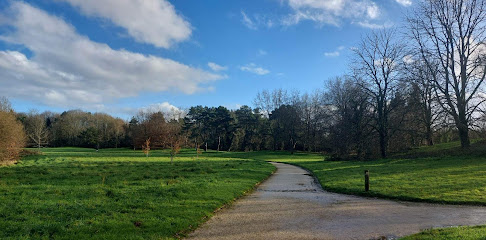
Rennes Opera house
Experience the grandeur of Rennes Opera House, a cultural gem in the heart of Brittany, offering stunning performances and rich architectural beauty.
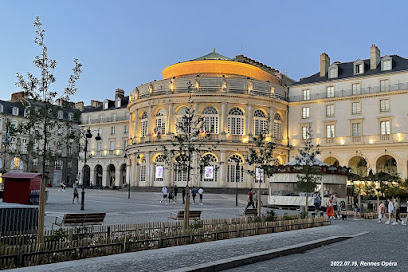
Tourist Office of Rennes
Explore Rennes with expert guidance from the Tourist Office, your essential resource for discovering the city’s culture, attractions, and hidden gems.
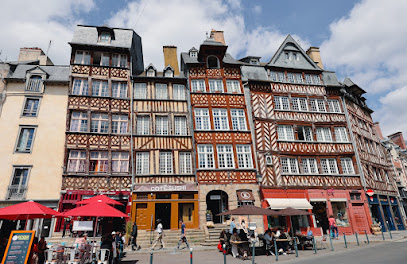
Hôtel Mercure Rennes Centre Parlement
Comfortable accommodations and a prime location await at Hôtel Mercure Rennes Centre Parlement, your gateway to exploring the vibrant city of Rennes.
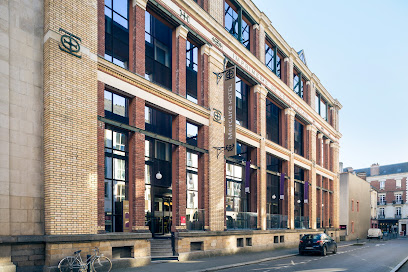
La Réserve
Experience the essence of French cuisine at La Réserve in Rennes, where local ingredients meet an exquisite wine selection, creating unforgettable dining memories.
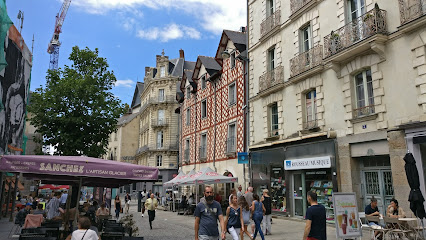
Space Sciences
Discover the universe's secrets at Espace des Sciences, Rennes' premier science museum featuring a planetarium and interactive exhibits for all ages.
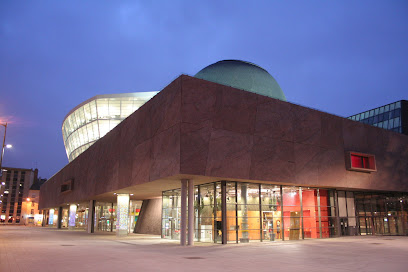
Portes Mordelaises - Site historique Rennes centre
Explore the historical allure of Portes Mordelaises, a must-see landmark in Rennes that captures the essence of the city's medieval heritage.
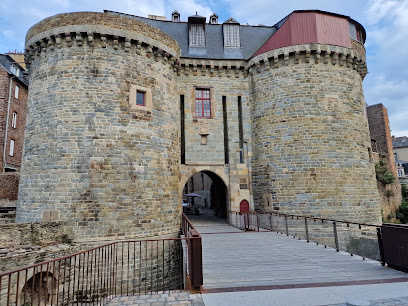
Unmissable attractions to see
Parc du Thabor
Explore Parc du Thabor in Rennes – a stunning park with breathtaking gardens, peaceful pathways, and delightful nature experiences for all visitors.
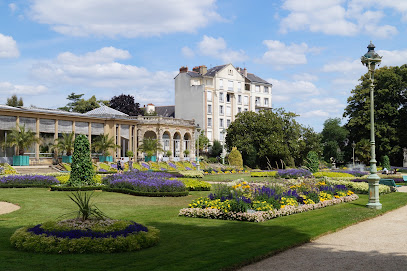
Parc des Gayeulles
Explore Rennes's largest park: a 100-hectare green space with diverse landscapes, recreational activities, and natural beauty for all ages.
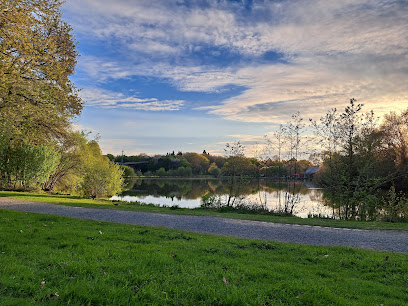
Port de Dinan
Discover the historic Port de Dinan: a charming marina with medieval connections, scenic views, and waterfront dining in Brittany.
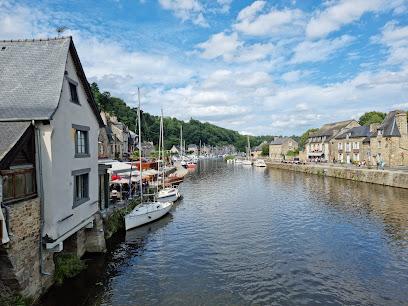
Cathedral Saint-Pierre de Rennes
Discover Rennes' architectural marvel, Cathédrale Saint-Pierre, a blend of Gothic and Neoclassical styles with a rich history dating back to the 6th century.
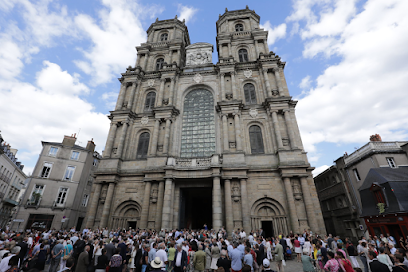
Musée des Beaux-Arts de Rennes
Explore art through the ages at Musée des Beaux-Arts de Rennes, from Egyptian antiquities to European masterpieces and modern treasures.
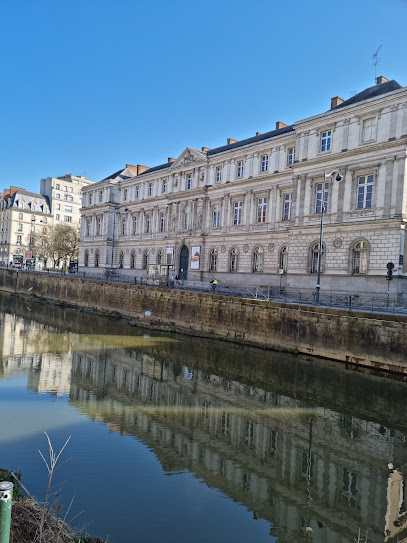
Park Hamelin Oberthur
Discover a serene escape in Rennes at Park Hamelin Oberthur, a botanical garden blending natural beauty with historical significance.
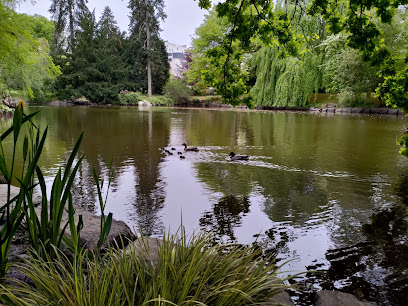
Park Bréquigny
Discover Park Bréquigny in Rennes: a spacious green retreat with playgrounds, nature areas, and contemporary art for everyone to enjoy.
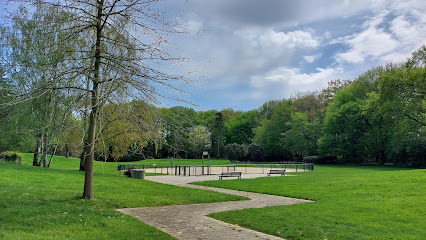
Écomusée du pays de Rennes
Discover five centuries of rural history at the Écomusée du Pays de Rennes, a captivating journey into Brittany's agricultural past.
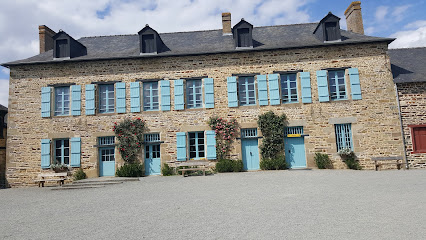
Site historique des Forges de Paimpont
Explore Brittany's industrial heritage at Les Forges de Paimpont, a historic ironworking site in the heart of the legendary Brocéliande forest.
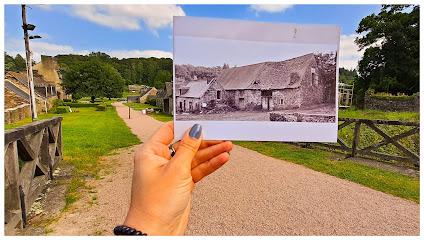
parc de Beauregard
Discover Parc de Beauregard in Rennes: a modern, solar-themed park blending art, nature, and recreation for a unique urban experience.
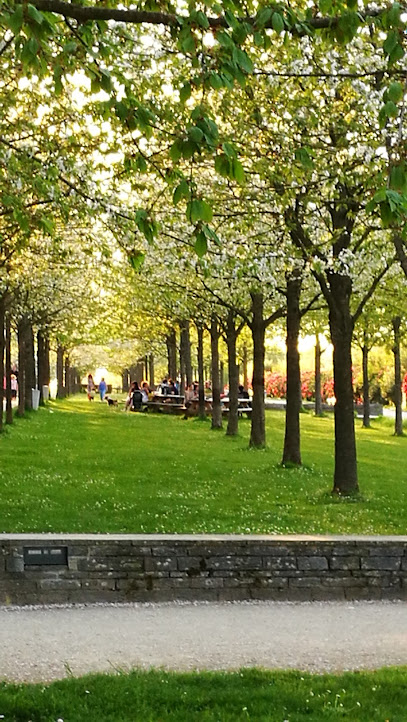
Space Sciences
Explore the universe and beyond at Rennes' premier science museum, featuring interactive exhibits and a state-of-the-art planetarium.
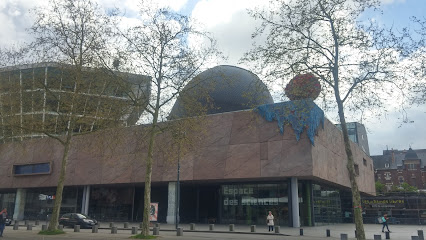
Frac Bretagne
Explore contemporary art in a striking architectural setting at Frac Bretagne, Rennes. Discover innovative exhibitions and diverse artistic expressions.
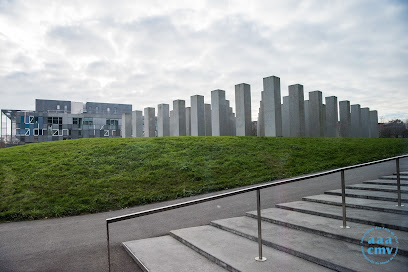
Musée de Bretagne
Explore Brittany's captivating history and culture at the Musée de Bretagne in Rennes, from ancient times to the present day.
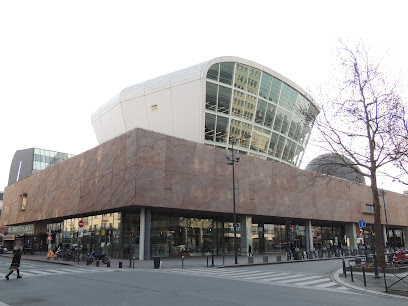
Château de Montmuran
Explore a majestic medieval castle in Brittany, where history comes alive through impressive architecture and tales of knights and nobility.
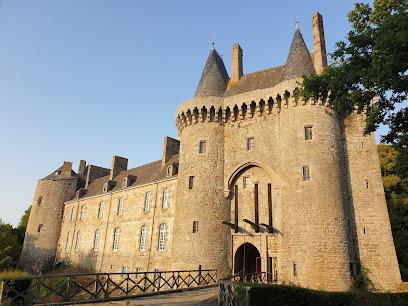
Orangerie du Thabor
Discover botanical history and serene beauty at Rennes' Orangerie du Thabor, a horticultural haven in the heart of Thabor Park.
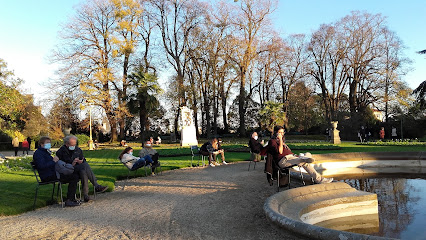
Essential places to dine
Les Fils à Maman Rennes
Experience the heart of French cuisine at Les Fils à Maman Rennes – where tradition meets modernity in every bite.
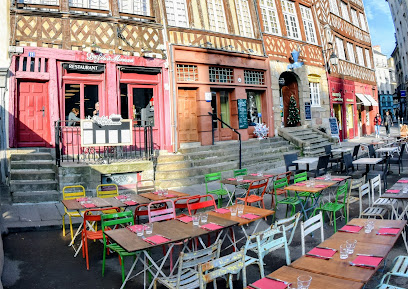
La Saint-Georges
Experience authentic French cuisine at La Saint-Georges Crêperie in Rennes – where every bite tells a story.
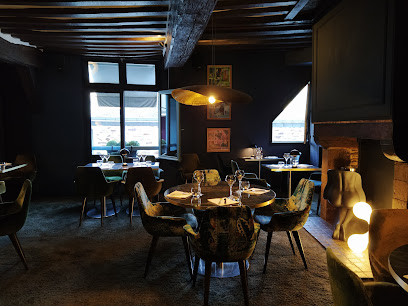
La Taverne de la Marine
Experience exquisite French cuisine and fresh seafood at La Taverne de la Marine in Rennes - a culinary delight amidst historical charm.
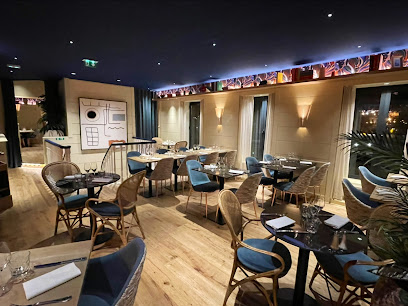
Le Grill
Discover the culinary delight of Le Grill in Rennes – where exquisite grilled meats meet traditional French hospitality.
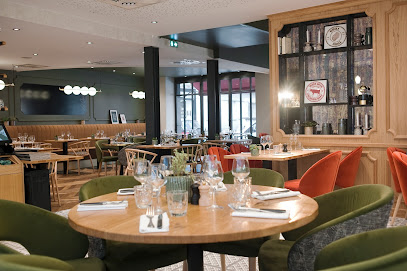
Le Piccadilly Rennes
Experience authentic French cuisine at Le Piccadilly Rennes - where culinary excellence meets cozy ambiance.
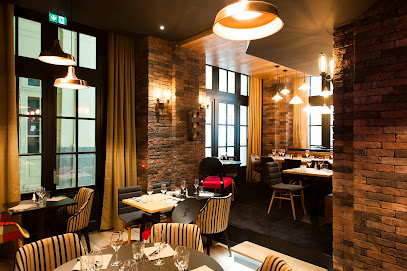
L'Ambassade de Rennes
Discover the essence of French cuisine at L'Ambassade de Rennes - where tradition meets innovation in every bite.
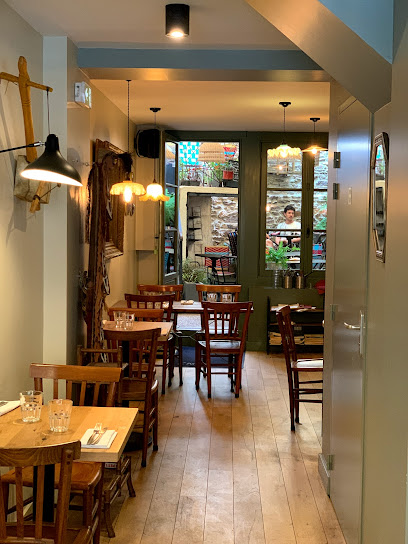
La Chope
Discover La Chope in Rennes: A delightful bistro serving exquisite haute French cuisine with seasonal flavors in an inviting atmosphere.
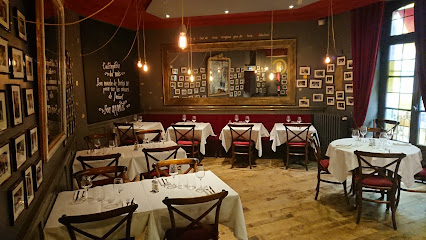
Léon le Cochon
Experience authentic French cuisine at Léon le Cochon in Rennes—where traditional flavors meet cozy bistro charm.

Les Brocanteurs
Experience authentic French cuisine at Les Brocanteurs in Rennes - where tradition meets modern flair in every bite.
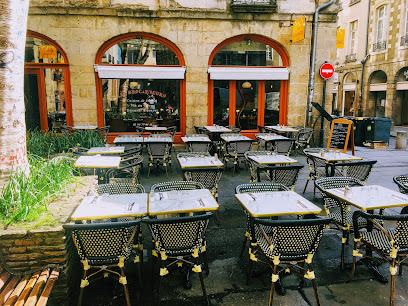
Le Galopin
Experience modern French cuisine at Le Galopin in Rennes - where fresh seafood meets elegant dining.
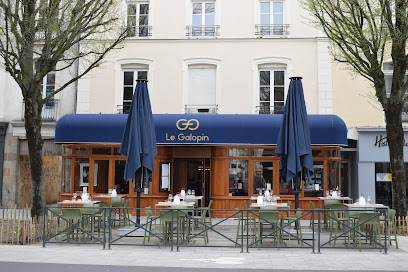
Coquille
Experience authentic French cuisine at Coquille Bistro in Rennes – where every meal is a taste of tradition.
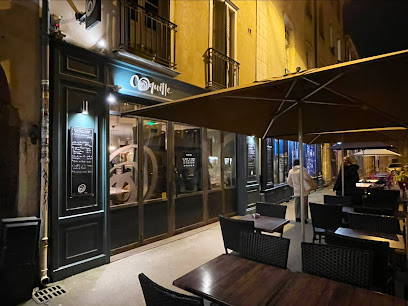
Café Breton
Experience authentic French cuisine at Café Breton in Rennes – home to delightful crepes and traditional dishes crafted with love.
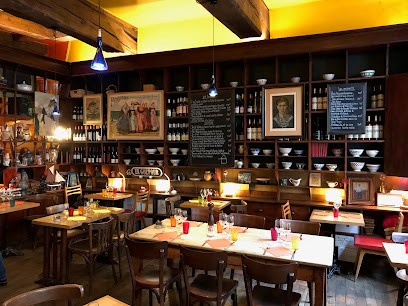
Restaurant IMA
Discover exquisite French cuisine at Restaurant IMA in Rennes – where traditional flavors meet modern culinary artistry.
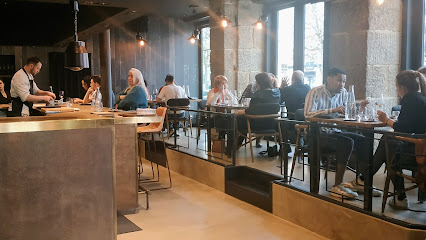
Chez Brume
Discover the exquisite fusion of French and Mediterranean flavors at Chez Brume in Rennes – where every dish is crafted with passion.
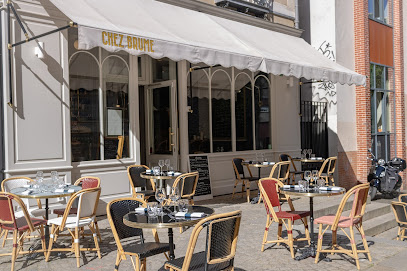
L' AOC
Discover authentic French cuisine at L' AOC in Rennes - where tradition meets culinary excellence.
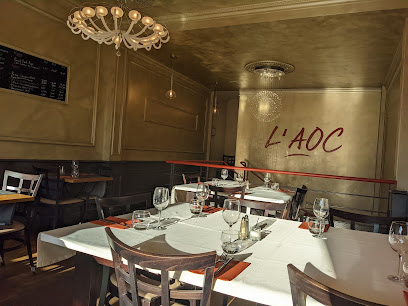
Markets, malls and hidden boutiques
Rennes Alma
Experience the best of shopping, dining, and entertainment at Rennes Alma, a vibrant shopping mall in the heart of Rennes, France.
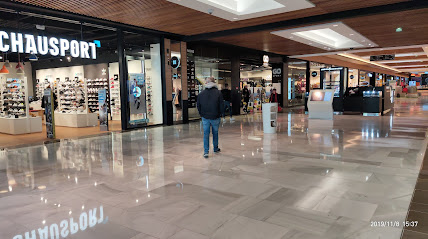
Centre commercial Colombia
Discover Centre Commercial Colombia, a vibrant shopping hub in Rennes, offering a delightful mix of stores, dining, and leisure activities for all visitors.
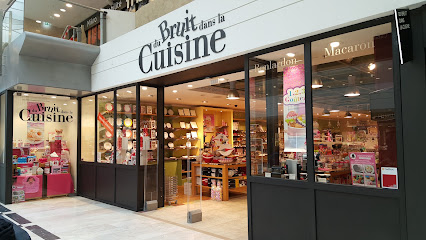
La Visitation
Discover La Visitation, Rennes' bustling shopping mall filled with fashion, dining, and entertainment options for every traveler.
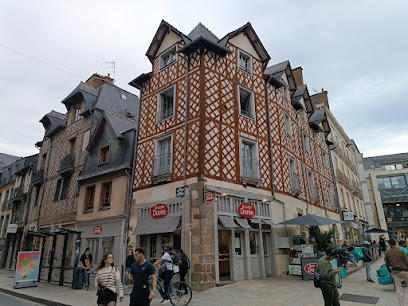
Galeries Lafayette Rennes
Discover Galeries Lafayette Rennes, where fashion meets lifestyle in an iconic department store experience.
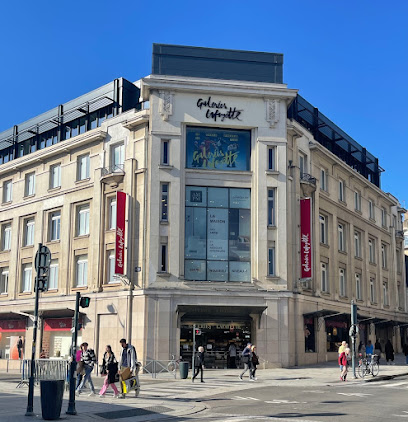
Les Trois Soleils
Discover Rennes' bustling shopping haven at Les Trois Soleils, where fashion, food, and fun come together in a vibrant atmosphere.
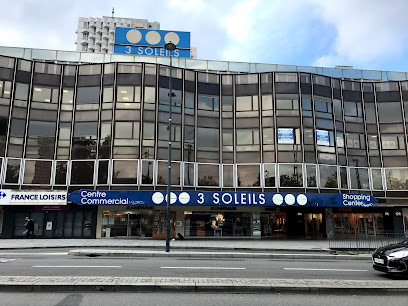
UNIQLO RENNES
Explore UNIQLO Rennes for stylish, high-quality clothing for the whole family, right in the heart of beautiful Rennes.
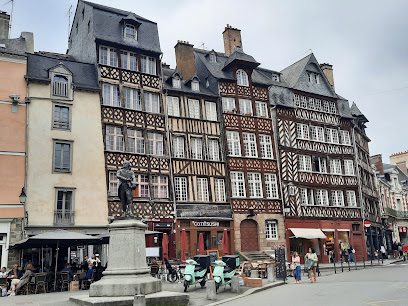
Søstrene Grene
Explore Søstrene Grene for unique art supplies, charming home decor, and delightful handicrafts in the heart of Rennes.
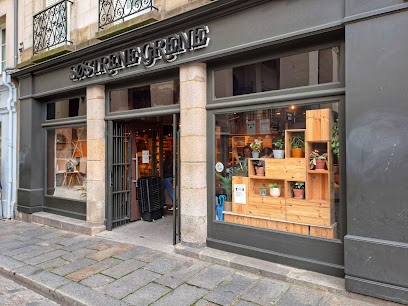
Bershka
Explore the latest trends in fashion at Bershka in Rennes, where style meets affordability for both men and women.
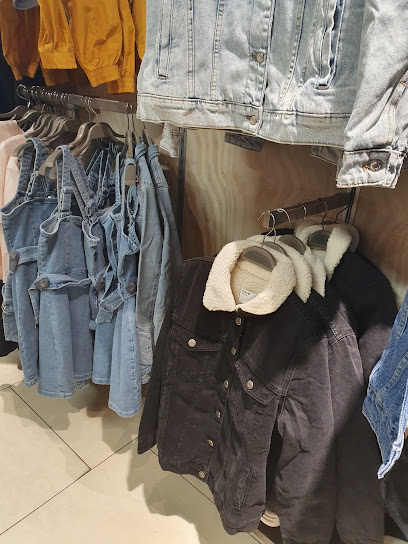
À l'Ombre des Marques Rennes
Explore À l'Ombre des Marques in Rennes for a diverse selection of fashion for all ages, blending style and comfort in one vibrant destination.
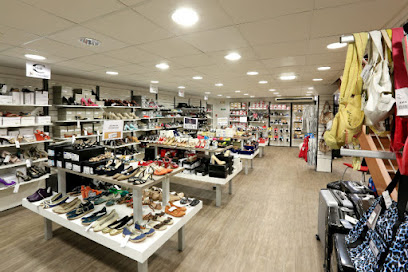
Passage du Désir, l'anti sex shop
Explore a unique gift shop in Rennes offering a blend of adult entertainment and wellness products in a welcoming atmosphere.
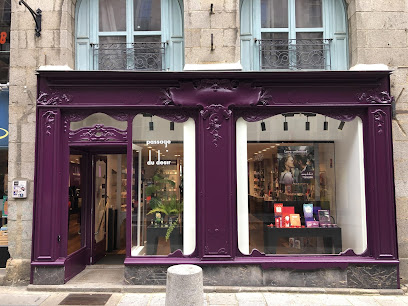
Vacarme
Discover vintage treasures and handmade crafts at Vacarme, a unique vintage clothing store and tea house in Rennes, France.
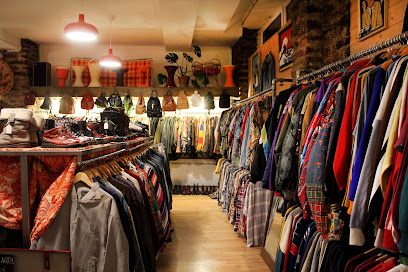
La Droguerie
Discover the artistic world of La Droguerie in Rennes, where quilting, beadwork, and creativity come together in a vibrant crafting community.
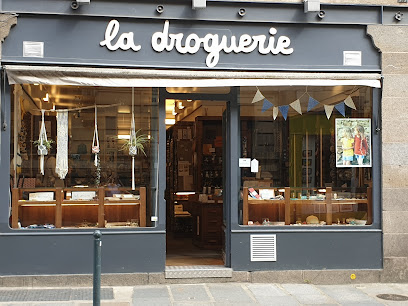
Le Comptoir Irlandais Rennes
Explore the vibrant Le Comptoir Irlandais Rennes for unique Irish gifts, gourmet delights, and a taste of authentic Irish culture.
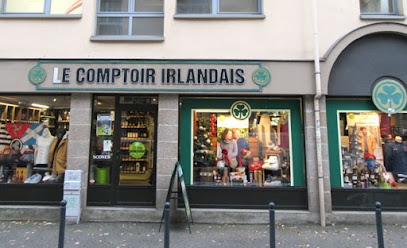
French Blossom
Explore French Blossom in Rennes for unique gifts, charming children's clothing, and delightful home goods that embody French craftsmanship.
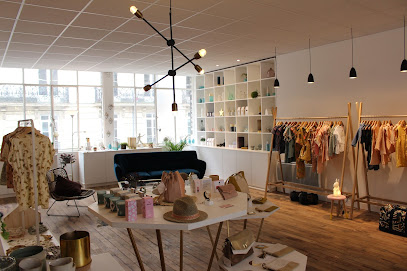
Antoine and Colette vintage shop
Explore the timeless elegance of vintage fashion at Antoine and Colette, a must-visit treasure trove in the heart of Rennes.
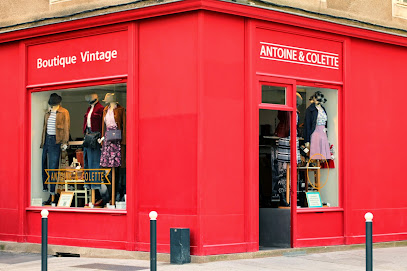
Essential bars & hidden hideouts
Penny Lane
Experience the vibrant nightlife of Rennes at Penny Lane, a lively pub featuring cocktails, live music, and an inviting atmosphere for all.
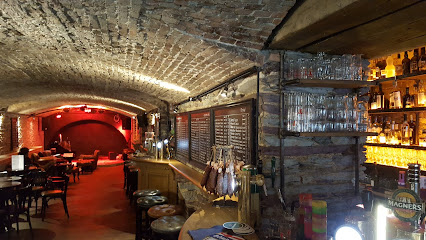
Fox and Friends Pub
Discover the vibrant atmosphere of Fox and Friends Pub, a top destination in Rennes for great drinks and delicious pub food.
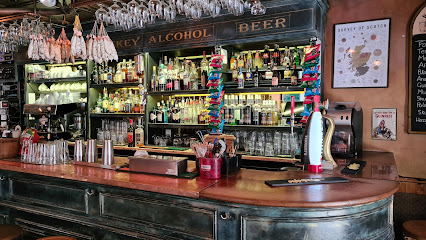
L'Annexe
Discover the vibrant nightlife of Rennes at L'Annexe, a stylish bar offering a diverse drink selection and a lively atmosphere.
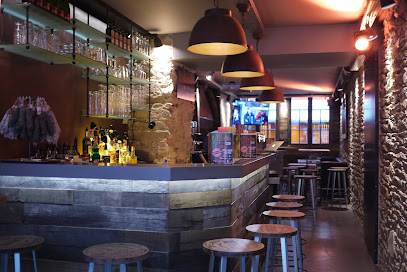
Tiffany's Pub Rennes
Experience the vibrant nightlife at Tiffany's Pub in Rennes, where great drinks and a welcoming atmosphere await every traveler.
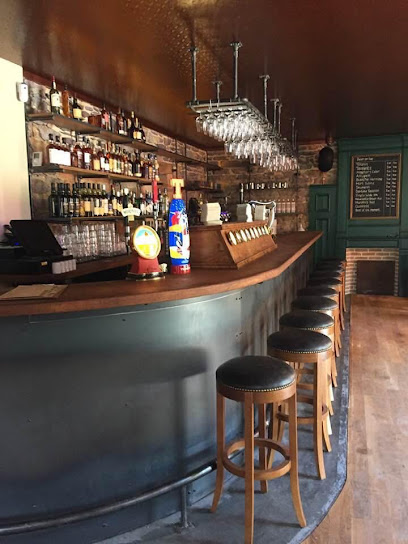
La Cité d'Ys
Experience the vibrant nightlife of Rennes at La Cité d'Ys, where exceptional drinks and a lively atmosphere await you.
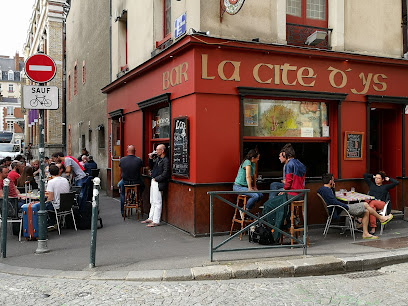
Bar le Saint Germain
Discover the vibrant atmosphere of Bar le Saint Germain in Rennes, where craft beer, delicious tapas, and lively events create unforgettable moments.
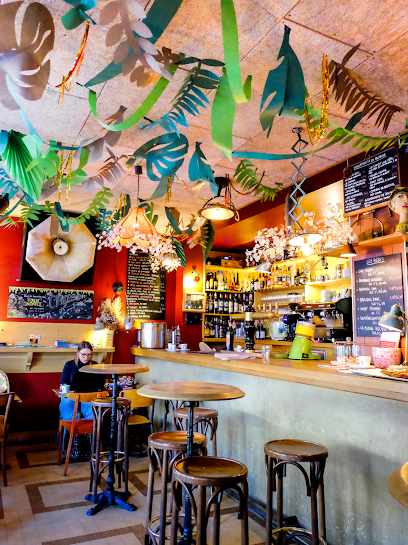
Sunset Café
Discover Sunset Café in Rennes, a cozy bar with a lively atmosphere and a diverse selection of drinks for a memorable night out.
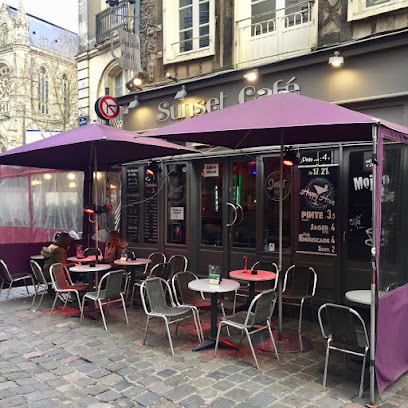
Black Bear
Discover Black Bear in Rennes, a lively bar offering a warm ambiance and a diverse drink selection, perfect for an unforgettable night out.
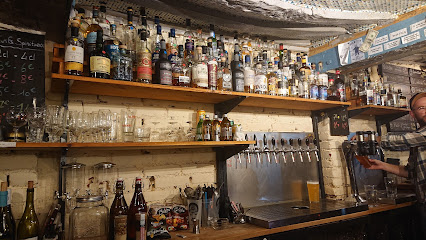
KilKenny's Pub
Discover the vibrant atmosphere of KilKenny's Pub in Rennes, where authentic Irish hospitality meets local charm and lively entertainment.
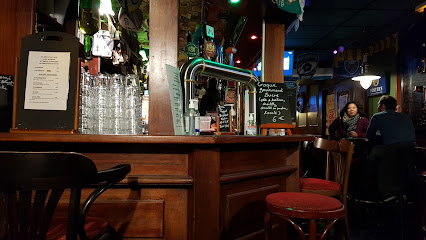
Le Zing
Discover the lively spirit of Rennes at Le Zing, a vibrant bar offering a delightful selection of drinks in an inviting atmosphere.
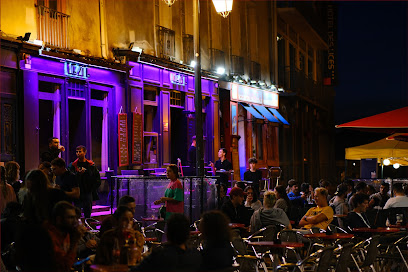
Peacock Rennes
Experience the vibrant cocktail culture of Rennes at Peacock Rennes, where innovative drinks meet a lively atmosphere.
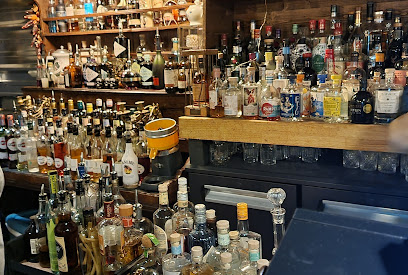
Le Montfort
Discover the vibrant culinary scene at Le Montfort, a premier cocktail bar and restaurant in the heart of Rennes, blending local flavors with global inspirations.
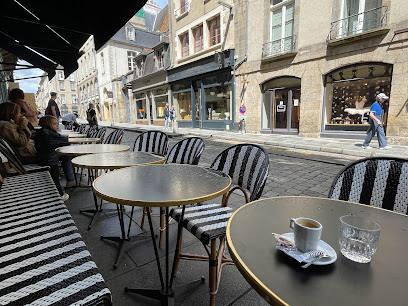
Melody Nelson
Discover the enchanting ambiance and expertly crafted cocktails at Melody Nelson, the premier cocktail bar in the heart of Rennes, France.
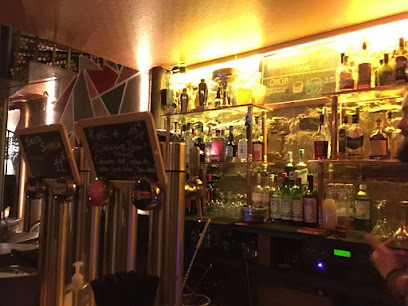
Le Klub
Experience the vibrant atmosphere of Le Klub, a premier wine bar in Rennes offering exquisite wines, cocktails, and delectable brunch options.
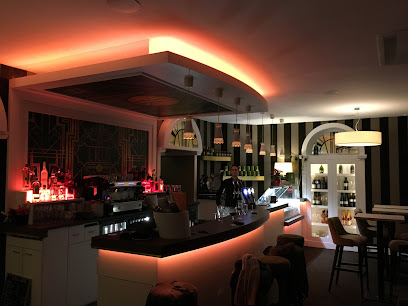
Local Phrases
-
- HelloBonjour
[bon-zhoor] - GoodbyeAu revoir
[oh ruh-vwahr] - YesOui
[wee] - NoNon
[nohn] - Please/You're welcomeS'il vous plaît / De rien
[seel voo pleh / deh ryen] - Thank youMerci
[mehr-see] - Excuse me/SorryExcusez-moi/Désolé
[ehks-kew-zay mwah / deh-zoh-lay] - How are you?Comment ça va?
[koh-mohn sa vah] - Fine. And you?Bien. Et vous?
[byen. ay voo] - Do you speak English?Parlez-vous anglais?
[par-lay voo ahn-glay] - I don't understandJe ne comprends pas
[zhuh nuh kohm-prahnd pah]
- HelloBonjour
-
- I'd like to see the menu, pleaseJe voudrais voir la carte, s'il vous plaît
[zhuh voo-dray vwahr lah kart, seel voo pleh] - I don't eat meatJe ne mange pas de viande
[zhuh nuh mahnj pah duh vyand] - Cheers!Santé!
[sahn-tay] - I would like to pay, pleaseJe voudrais payer, s'il vous plaît
[zhuh voo-dray pay-ay, seel voo pleh]
- I'd like to see the menu, pleaseJe voudrais voir la carte, s'il vous plaît
-
- Help!Au secours!
[oh suh-koor] - Go away!Allez-vous en!
[ah-lay voo zahn] - Call the Police!Appelez la police!
[ah-pay-lay lah plees] - Call a doctor!Appelez un médecin!
[ah-pay-lay uh may-deh-sahn] - I'm lostJe suis perdu
[zhuh swee pair-doo] - I'm illJe suis malade
[zhuh swee mah-lahd]
- Help!Au secours!
-
- I'd like to buy...Je voudrais acheter...
[zhuh voo-dray zah-shey...] - I'm just lookingJe regarde juste
[zhuh ruh-gahrd zheust] - How much is it?Combien ça coûte?
[kohm-byen sah koot] - That's too expensiveC'est trop cher
[say troh shair] - Can you lower the price?Pouvez-vous baisser le prix?
[poo-veh voo beh-say luh pree]
- I'd like to buy...Je voudrais acheter...
-
- What time is it?Quelle heure est-il?
[kell uhr ay-teel] - It's one o'clockIl est une heure
[eel ay oon uhr] - Half past (10)Dix heures et demie
[deeze uhr ay duh-mee] - MorningMatin
[ma-tahn] - AfternoonAprès-midi
[ah-pray mee-dee] - EveningSoir
[swahr] - YesterdayHier
[yehr] - TodayAujourd'hui
[oh-zhoor-dwee] - TomorrowDemain
[duh-man] - 1Un
[uhn] - 2Deux
[duh] - 3Trois
[twah] - 4Quatre
[kat-ruh] - 5Cinq
[sank] - 6Six
[sees] - 7Sept
[sept] - 8Huit
[weet] - 9Neuf
[nuf] - 10Dix
[deeze]
- What time is it?Quelle heure est-il?
-
- Where's a/the...?Où est...?
[oo ay...] - What's the address?Quelle est l'adresse?
[kell ay lah-dress] - Can you show me (on the map)?Pouvez-vous me montrer (sur la carte)?
[poo-veh voo muh mohn-tray (surr lah kart)] - When's the next (bus)?Quand est le prochain (bus)?
[kahn ay luh proh-shahn (bus)] - A ticket (to ....)Un billet (pour ...)
[uhn bee-yay (poor)]
- Where's a/the...?Où est...?
History of Rennes
-
Rennes, known in ancient times as Condate, was founded by the Redones, a Gallic tribe. It became a significant settlement during the Roman era, thriving as a hub of commerce and culture. Remnants of Roman architecture, such as the ancient city wall and the amphitheater, still echo the city's storied past.
-
During the Middle Ages, Rennes was a pivotal city in the Duchy of Brittany. The construction of the Cathedral of Saint-Pierre and the Parliament of Brittany marked its importance. The city's medieval charm is preserved in its timber-framed houses and narrow cobblestone streets.
-
In 1720, a devastating fire ravaged Rennes, destroying much of its wooden architecture. The disaster led to a major reconstruction effort, spearheaded by architect Jacques Gabriel, resulting in a more modern and uniform cityscape. The classical style of Rennes' city center traces back to this period.
-
Rennes played a significant role during the French Revolution. The city was a hotbed of revolutionary activity, and the Parliament of Brittany was a focal point for political discourse. The revolutionary fervor is reflected in various monuments and the renaming of public spaces during that era.
-
The 19th century brought industrialization to Rennes, transforming it into a modern city. The arrival of the railway in 1857 connected Rennes to the rest of France, boosting trade and population growth. This era saw the development of new neighborhoods and the expansion of the city's infrastructure.
-
Rennes endured significant hardship during World War II. The city was occupied by German forces, and many of its buildings were damaged or destroyed by bombings. The liberation of Rennes in August 1944 was a pivotal moment, celebrated annually with commemorative events.
-
In recent decades, Rennes has experienced a cultural and economic renaissance. The city is renowned for its vibrant arts scene, prestigious universities, and technological innovation. Modern Rennes balances its rich historical heritage with a dynamic and forward-thinking spirit, evident in its festivals, museums, and urban development projects.
Rennes Essentials
-
Rennes is located in the Brittany region of France. The nearest international airport is Rennes-Saint-Jacques Airport, situated about 7 kilometers from the city center. Major airlines operate flights to and from various European cities. Alternatively, you can reach Rennes by train from Paris, which takes approximately 1.5 to 2 hours via the high-speed TGV service. Buses also connect Rennes to other major cities in France.
-
Rennes has an efficient public transportation system operated by STAR, including buses and a metro line. A single metro line, Line A, runs from the southwest to the northeast of the city. Buses cover extensive routes throughout the city and its suburbs. Taxis are available and can be easily hailed on the street or booked via apps. Biking is also a popular option, with many bike rental stations around the city.
-
The official currency in France is the Euro (€). Credit and debit cards are widely accepted in most establishments, including restaurants, hotels, and shops. ATMs are readily available throughout Rennes for cash withdrawals. It is advisable to carry some cash, especially when visiting smaller shops or markets.
-
Rennes is generally a safe city for tourists. However, as with any urban area, it is important to stay vigilant. Avoid poorly lit areas at night, and be cautious in crowded places to prevent pickpocketing. The neighborhoods of Maurepas and Villejean have higher crime rates, so it is advisable to exercise extra caution when visiting these areas.
-
In case of an emergency, dial 112 for immediate assistance, which is the universal emergency number in Europe. For non-urgent police matters, you can dial 17. The main hospital in Rennes is Centre Hospitalier Universitaire (CHU) de Rennes, which offers comprehensive medical services. Pharmacies are also available throughout the city for minor health issues.
-
Fashion: Do dress stylishly but comfortably. Rennes is a fashionable city, and locals appreciate well-dressed individuals. Avoid overly casual attire like flip-flops and beachwear. Religion: Do respect religious customs when visiting churches. Dress modestly and maintain a quiet demeanor. Public Transport: Do validate your ticket before boarding the metro or bus. Don't forget to give up your seat to elderly passengers or those with disabilities. Greetings: Do greet people with a friendly 'Bonjour' and a handshake. Avoid overly familiar gestures such as hugs. Eating & Drinking: Do try local specialties like galettes and cider. Don't rush your meals; dining is a leisurely activity in France.
-
To experience Rennes like a local, visit the Marché des Lices, one of the largest markets in France, held every Saturday. Explore the Thabor Gardens, a beautiful park that locals frequent. For a cultural experience, attend a performance at the Théâtre National de Bretagne. Engage with locals in cafés and bistros to learn more about the city's culture and history.
Trending Landmark in Rennes
-
Parc du Thabor
-
Parc des Gayeulles
-
Le Liberté
-
Cathedral Saint-Pierre de Rennes
-
Musée des Beaux-Arts de Rennes
-
Couvent des Jacobins
-
Park Hamelin Oberthur
-
Balthazar Hôtel & Spa Rennes - MGallery
-
Park Bréquigny
-
Rennes Opera house
-
Tourist Office of Rennes
-
Hôtel Mercure Rennes Centre Parlement
-
La Réserve
-
Space Sciences
-
Portes Mordelaises - Site historique Rennes centre
Nearby Cities to Rennes
-
Things To Do in Saint-Malo
-
Things To Do in Nantes
-
Things To Do in Angers
-
Things To Do in St. Clement
-
Things To Do in St. Helier
-
Things To Do in Gorey
-
Things To Do in St. Aubin
-
Things To Do in St. Brelade
-
Things To Do in St. Peter
-
Things To Do in St. Lawrence
-
Things To Do in Trinity
-
Things To Do in St. Ouen
-
Things To Do in Caen
-
Things To Do in St. Anne
-
Things To Do in St. Martin
















